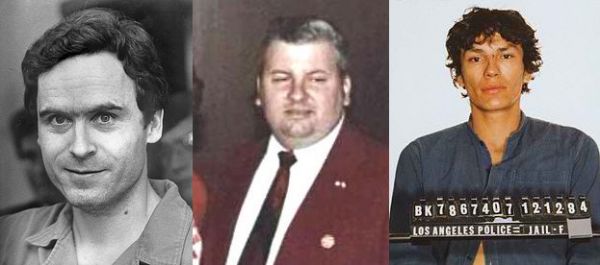
Ted Bundy, John Wayne Gacy, and Richard Ramirez/public domain
The serial killers you know are those you either remember or have seen a movie about: Richard Ramirez, David Berkowitz, John Wayne Gacy, Ted Bundy, and Jeffrey Dahmer. There were others, most of them operating between the late 1960s and the turn of the century. Then the era of serial killers petered out. Why?
Criminal justice expert Peter Vronksy, whose new book American Serial Killers: The Epidemic Years looks to answer just that question, says that more than 80 percent of known American serial killers operated between 1970 and 1999. “It’s an era that was coined as the ‘golden age of serial murder‘ by Harold Schechter, who was a crime historian,” Vronsky tells Rolling Stone. The reason behind this is manyfold — encompassing everything from sociological changes, to biology, to technology, to linguistics.
Over the course of his work, which began in 1979, Vronsky has deduced that serial killers generally develop the personality and compulsion befitting a killer when they’re young — by the time they’re 14, they’re basically fully formed; they generally start killing in their late twenties. As such, he looked back at what was happening in the world when murderers like John Wayne Gacy, Jeffrey Dahmer, and Ted Bundy were growing up, and discovered a link: They were all born during wartime. “In cases like, for example, the BTK killer [Dennis Rader], Richard Cottingham [the Torso Killer], their fathers were returning war veterans with PTSD, which [was not a diagnosable illness until] the Eighties,” he says. In short: These children who were already predisposed to violence were raised in potentially violent, likely broken homes.
Intriguing, but not the entire explanation. Not everyone in that situation turned out to be a serial killer. Society has changed in other ways, and the news media also contributed by focusing on sensational stories colored by the public’s perception of the crimes, the perpetrators, and the victims. Frankly, I’ve written too many articles about historical serial killers to believe the late 20th century was truly an anomaly. Read about the ‘golden age of serial murder‘ and the reasons behind it at Rolling Stone. -via Damn Interesting





